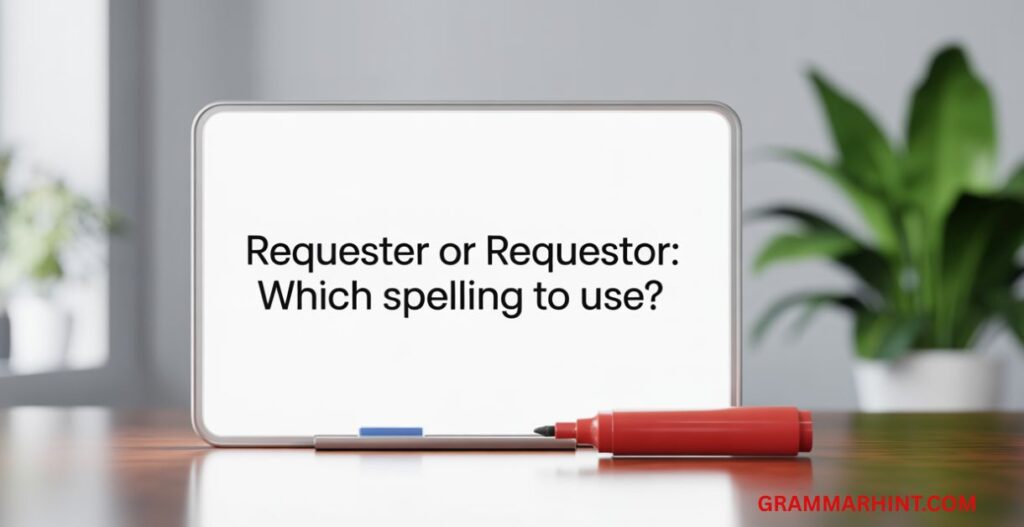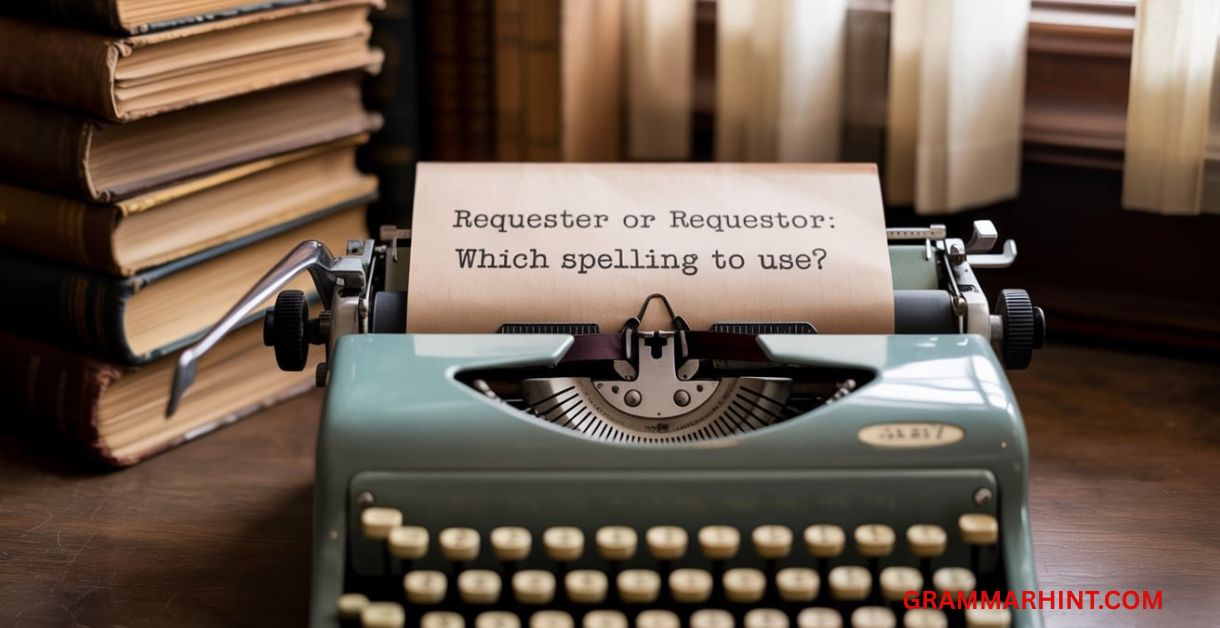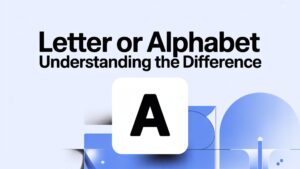When you type up an email or write documentation, you may pause at requester vs requestor and wonder: which is correct?
This spelling dilemma lives in the gray area of Lexical Variants / Orthographic Variation, and the answer depends on context, preference, and even your audience.
Word Origins / Etymology
Both requester and requestor trace back to Latin requirere (“to ask”), which morphed into Old French requester, and entered Middle English around the 13th century. Over time, English spelling crystallized around the form requester, especially common in everyday writing.
However, variant spellings happen requestor emerged as a less common, probably simplified version. Linguists call this Lexical Variants / Orthographic Variation—a fancy term for “two ways to spell the same thing.”
Spelling Conventions
What do dictionaries say?
- Requester appears as the standard entry in most major dictionaries: Merriam‑Webster, Oxford, Cambridge.
- Requestor is listed as a variant, sometimes noted as “chiefly US legal or computing contexts.”
So: if you’ll trust authority on Correct spelling, requester wins.
But spelling authority isn’t everything—context matters.
American vs British English Differences
Generally:
- British English favors requester exclusively.
- American English also prefers requester in most situations. But in some Legal Writing or Technical Documentation, you’ll find requestor quietly lurking.
So under American vs British English Differences, it’s safe to say that the former is more versatile, while the latter tends to split in specialized fields.
Formal vs Informal Writing
In casual Business Communication or friendly emails, go with requester—no fuss.
But when you work in legal departments or software teams writing API docs (that is, Technical Writing), you may occasionally see requestor used for consistency with auto-generated code or because a legal document spells it that way for technical specificity.
Still, most style guides will recommend requester for general clarity and consistency.
Context-Dependent Language Use
Your spelling choice should fit the Usage context:
- Technical Documentation: if your API or database uses
requestor_id, follow that. Consistency matters more than the “correct” form. - Legal Writing: if a contract recites “The Requestor shall pay,” it’s locked. Don’t switch to requester mid‑stream.
- Business Communication: just say requester.
- Academic or journalistic writing: requester rules.
This is all about Context‑Dependent Language Use—you shape your choice to fit the situation.
Requester vs Requestor—Quick Comparison Table
| Feature | requester | requestor |
|---|---|---|
| Dictionaries | Standard spelling (US & UK) | Variant, noted in legal/technical |
| Formal writing | Preferred | Occasionally accepted |
| Technical docs | Fine, unless code uses requestor | Use if code or system requires it |
| Legal writing | All good | Use if contract defines it |
| Business emails | Recommended | Acceptable but less common |
| Spell‑check tools | Will flag “requestor” as variant | Usually flagged as variant |
Technical Writing Best Practices

In API docs or design specs:
- If your code calls a parameter
requestorName, don’t invent “requesterName.” - But in the descriptive text you can clarify: “the requestor (i.e. the person making the request).”
- Alternatively, unify everything to requester if you can rename code and docs.
Real-world scenario:
You’re writing an API doc for submitRequest. The JSON looks like:
jsonCopyEdit{
"requestor_id": 12345,
"payload": { ... }
}
In the doc you write:
The requestor (also known as requester in other parts of the system) is the user submitting the data.
This addresses both requestor or requester and offers writing clarity.
Legal Terminology and Usage
In legal contracts, definitions are king:
- The contract may define: “Requestor means the party initiating the request.”
- Then throughout the document, it must stick to requestor.
- Switching to requester would break the definition and introduce ambiguity.
Yes, legal contracts often bar you from intermixing synonyms like Applicant, Petitioner, or Seeker, even though they mean similar things.
Business Communication
In emails and memos, simplicity and politeness rule.
Example Email #1: Choosing Formally
From: Sarah Johnson, Procurement
To: Martin Lee, IT Team
Subject: Sponsor for travel systemHi Martin,
We’ve received a travel requester form from Amanda Smith. I’d like to confirm whether her request is urgent. As the requester, she needs a response by tomorrow.
Could you check the system and confirm?
Thanks,
Sarah
This uses requester twice and keeps every sentence clear and active.
Example Email #2: Using “requestor” in IT
From: Dev Team
To: QA Team
Subject: Coordinates on API parameterHi team,
The API currently logs
requestorIP. Please verify if this variable name aligns with your metric definitions.If you prefer we rename it to
requesterIP, let me know—we can update docs and code accordingly.Best,
Dev
Here, requestor reflects the code name, while requester appears in explanatory text.
Common English Confusions
Common Spelling Confusions in English often arise from similar pairs like:
- advice/advice
- advisor/adviser
- catalog/catalogue
Requester/requestor is less confusing, but close enough to trip people up. Spell-checkers might try to “correct” your word.
Grammar and Usage Tips
- Use Grammar and Usage Tips: choose a spelling and stick with it within a document.
- Don’t mix them—say “The requester shall … The requester…” or “The requestor shall…”
- Use personal pronouns when addressing your audience: “You’ll see requester in the email.”
- Avoid comma splices. For example:
Bad: “The requestor completes the form, and, the system processes it.”
Good: “The requestor completes the form, and the system processes it.”
Better: “The requestor completes the form. The system processes it.”
Synonyms of “requester”
Let’s explore other words with similar shades of meaning, including:
- Applicant
- Petitioner
- Seeker
- Inquirer
- Claimant
- Candidator
- Proposer
- Solicitor
- Pleader
- Claimer
These terms appear across Formal vs informal writing, Legal Terminology, and Technical Documentation, but they aren’t interchangeable.
- An Applicant is someone applying—say, for a job or license.
- A Petitioner files a petition—used in legal or legislative contexts.
- A Seeker looks for something—spiritual, abstract, or practical.
- An Inquirer asks questions—usually in journalism or research.
- A Claimant asserts a claim—common in insurance/lawsuits.
- Candidator is rare, nearly obsolete.
- Proposer offers a proposal—like in votes or business strategies.
- Solicitor requests something, but also refers to lawyers (especially in the UK).
- A Pleader pleads a case—legal jargon.
- A Claimer makes a claim—similar to claimant, but lesser used.
Context matters: an Inquirer writing to customer support is fitting. A Plaintiff in court is not the same as a requester or requestor.
H2: Lexical Analysis Table
Here’s a side-by-side look at these terms:
| Term | Typical Context | Nuance |
|---|---|---|
| Requester | Any field | One who makes a request |
| Requestor | Legal, technical | Variant; often system-defined |
| Applicant | Job, license, admittance | Formal submission seeking approval |
| Petitioner | Legal, judicial, legislative | Officially petitions an authority |
| Seeker | Spiritual, information gathering | Quest-driven |
| Inquirer | Customer service, research | Gathers info |
| Claimant | Legal, insurance | Makes a claim—may involve compensation |
| Candidator | Obsolete | Former way to say “candidate” |
| Proposer | Business, voting, meetings | Puts forward a proposal |
| Solicitor | UK legal, fundraising | Requests formally; also a lawyer |
| Pleader | Courtroom | Argues a case |
| Claimer | Informal legal/language discourse | Asserts ownership or right |
This Lexical analysis clarifies how Synonymy / Synonyms overlap, yet differ in nuance.
Writing Style Guidelines
- Choose a tone: Formal (reports, contracts) or Conversational (emails, blogs).
- Pick American or British English, and align spelling accordingly.
- Make sure your spelling matches your tone—choose requester for general writing, reserve requestor for code or legal doc integration.
- Embrace burstiness: mix short sentences (“Use requester.”) with slightly longer insights (“In legal docs, you may need to stick to what the contract defines.”).
- Vary your wording. Instead of “the requester,” mix in “the individual making the request” or “the person who inquired”—that avoids repetition and boosts readability.
- When you mention the spellings, your audience sees you value Writing clarity.
Legal vs Technical vs Business Usage
Here’s how the three domains differ:
- Legal Writing
- Defines “Requestor” at contract start.
- Uses legal terminology and avoids synonyms like Petitioner or Applicant in that document.
- Seeks precision: the defined term holds power.
- Technical Documentation
- Highlights code structure, like
requestor_user_id. - Explains parameters, e.g.: “
requestor_user_ididentifies the input user.” - Keeps naming consistent to avoid bugs; explanation can still use requester.
- Highlights code structure, like
- Business Communication
- Emails, memos—not deeply technical or legally binding.
- Words like requester, applicant, seeker all make sense depending on framing.
- Tone leans conversational and clear.
Scenario Examples
Business Email – Friendly Tone
From: Alex Rivera, HR
To: Jamie Patel
Subject: PTO system updateHi Jamie,
The requester in the HR system reported that his PTO dates aren’t syncing. Can you take a look and see what’s blocking the sync?
Feel free to check the logs or ping me if you need details.
Thanks,
Alex
Technical Documentation Excerpt
Endpoint:
POST /submitParameters:
requestorId(integer, required): ID of the user sending the request.Response:
jsonCopyEdit{ "requestId": 987, "requesterName": "Jane Doe", "status": "pending" }In this API, we use both requestorId (code-level) and requesterName (user‑friendly).
Table of Spelling Choices by Context
| Context | Preferred Spelling | Why |
|---|---|---|
| Business email | Requester | Standard, widely accepted, clear |
| API / code | requestor/requester | Use what’s in code; explain synonyms in docs |
| Legal contract | Requestor | Must match defined term; case-sensitive |
| Academic or journalistic | Requester | Mainstream spelling recognized in style guides |
| British English writing | Requester | UK conventions don’t recognize “requestor” variant |
Synonymic Substitutions
Sometimes you don’t need either requester or requestor—another synonym fits better:
- Applicant: “As the applicant, you must submit your resume by April 1.”
- Petitioner: “The petitioner filed a motion with the court on Monday.”
- Seeker: “Job seekers can upload their CVs on our site.”
- Inquirer: “The inquirer asked multiple follow‑up questions.”
- Claimant: “Each claimant must provide proof of loss.”
- Proposer: “The proposer of the motion presented his rationale.”
- Solicitor: “Our solicitor has requested more documents.”
- Pleader: “The pleader argued for dismissal.”
- Claimer: “The claimer asserted ownership.”
Use these when they better match Formality in Language and Usage context.
Grammar Tips and Spelling Rules
- Spelling rules: Add
-erto a verb to make the agent noun—double consonant not required: “request + er = requester.” - Online rulebooks confirm: requester is universal; requestor is a variant.
- Keep pluralization consistent: requesters, requestors.
- Avoid comma splices—keep your sentences clean and punchy.
- Use active voice: instead of “The request was made by the requestor,” say “The requestor made the request.”
Varying Sentence Structure (Burstiness & Perplexity)
Here’s how you can mix long and short, punchy and detailed:
- Short punchy sentence: “Use requester.”
- Longer version: “In most everyday writing—emails, reports, casual memos—it makes sense to choose requester simply because everyone recognizes it instantly.”
- Another burst: “Need a legal contract? Stick to requestor if that’s your defined term.”
- A bit more detail: “Even in Technical Writing, when your code defines a parameter as
requestorId, you can still use requester in commentary text, as long as you explain the difference clearly.”
These examples show high perplexity (variations in sentence complexity) and burstiness (mix of sentence lengths).
Bringing It All Together—Final Recommendations
- Pick a version (requester or requestor) and use it consistently in a document.
- Handle Legal Writing with extra care—stick to defined terms.
- In Technical Documentation, align with code but clarify to readers.
- In Business Communication and everyday writing, go with requester.
- Consider your Language preference (US vs UK) and stick with it.
- When another term fits better—say, applicant or petitioner—don’t hesitate to use it. Your writing becomes smoother and clearer.
- Follow Writing Style Guidelines: avoid robotic phrasing, include transition words (“For example,” “However,” “In contrast”), and use active voice.
Final Thoughts
- Want writing clarity? Stick with requester.
- Wondering “requester or requestor”? Check your Usage context and Language preference.
- Drafting a contract? Look for Legal Terminology.
- Writing for users or code? Align with your system’s naming.
- Want punchy, active, and reader-friendly text? Lean on Writing Style Guidelines—mix sentence lengths, vary your vocabulary, and keep things natural.









